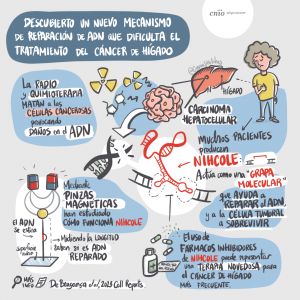En el cáncer de hígado de peor pronóstico
El equipo de Puri Fortes descubrió hace unos años que aproximadamente la mitad de los pacientes de carcinoma hepatocelular (el cáncer de hígado más común) producen una molécula de RNA, llamada NIHCOLE, que está sobre todo en los tumores más agresivos y se asocia con un mal pronóstico. Fortes, Llorca y Moreno-Herrero concluyeron que NIHCOLE ayuda a reparar muy eficazmente el DNA roto, y por eso la radioterapia es menos efectiva en aquellos tumores en que está presente. Eliminando NIHCOLE, las células cancerígenas tratadas con radioterapia mueren más fácilmente.
Pero los investigadores no conocían el mecanismo molecular por el que NIHCOLE facilita la reparación de roturas en el DNA. El trabajo ahora publicado en Cell Reports lo explica: NIHCOLE forma un puente que une los fragmentos del DNA roto.
“NIHCOLE interactúa simultáneamente con proteínas que reconocen los dos extremos de un DNA fragmentado, como si los grapara”, explican Llorca y Moreno-Herrero.
Comprender este mecanismo puede ayudar a diseñar estrategias para combatir el cáncer de hígado de peor pronóstico. “El uso de fármacos inhibidores de NIHCOLE puede representar una terapia novedosa para el cáncer de hígado más frecuente”, indican estos investigadores.
Nanopinzas magnéticas para estirar DNA
Para entender cómo actúa NIHCOLE el grupo de Fernando Moreno-Herrero ha usado pinzas magnéticas, una técnica de nanotecnología que hace posible estudiar las características físicas de las moléculas por separado.
Los investigadores han diseñado una molécula de DNA que mimetiza un DNA roto, y que permite detectar la unión entre los dos extremos fragmentados. Primero pegan a uno de los extremos del DNA una bolita magnética minúscula, de milésimas de milímetro; después, con pinzas magnéticas, tiran de ese extremo. La longitud del DNA estirado informa de si se trata de un DNA reconstituido, en el que los extremos rotos del DNA se han pegado, o si por el contrario sigue habiendo fractura.
Para los autores del trabajo en Cell Reports, estos datos muestran que NIHCOLE “confiere ventajas a las células tumorales ayudándolas en la reparación de roturas en el DNA, sosteniendo la proliferación maligna de las células cancerosas a pesar de la acumulación de daños en el DNA que resulta del estrés que produce la propia división celular”.
Un ‘DNA basura’ que ya no lo es
NIHCOLE no es una proteína sintetizada por un gen, sino una molécula de RNA. Forma parte de lo que se produce a partir de lo que hace dos décadas, cuando se secuenció el genoma humano, los biólogos llamaban DNA basura. Creían, erróneamente, que este DNA no servía para nada.
Lo explica Llorca: “Uno de los dogmas centrales de la biología es que la información contenida en cada gen, en el DNA, se traduce a proteínas. Así que los científicos se quedaron atónitos cuando descubrieron que sólo el 2% de nuestro DNA contenía genes; ¿para qué servía el resto de nuestro genoma? Es impensable que el 98% del genoma sea DNA basura, inútil. En la última década se ha demostrado que parte de este genoma oscuro produce moléculas de RNA muy largas, algunas con una función prevalente en cáncer”.
NIHCOLE es una de estas moléculas de RNA largas, cuya existencia y funciones se conocen hace tan poco que aún maravilla a los biólogos. Sorprende también que basta un pequeño trozo de NIHCOLE para ejercer el efecto de grapa molecular.
“Esto permitiría desarrollar fármacos que bloqueen o distorsionen esta estructura, y así mejorar la eficacia de la radio o la quimioterapia en pacientes con cáncer”, afirman los autores del trabajo.
Referencia científica
De Bragança et al. APLF and long non-coding RNA NIHCOLE promote stable DNA synapsis in non-homologous end joining. Cell Reports, 2023.
https://doi.org/10.1016/j.celrep.2022.111917
Noticia elaborada por la oficina de prensa del Centro Nacional de Investigaciones Oncológicas






